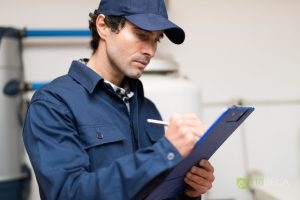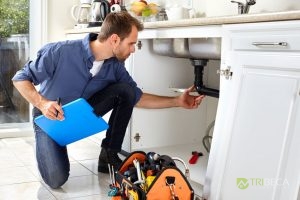
As Part of a Plumbing Inspection, You Should Expect a Comprehensive Report on Your System.
A plumbing inspection represents one of the most important types of preventative maintenance for your home. Unfortunately, while most homeowners appreciate the necessity of air conditioning or heating maintenance, they frequently overlook the needs of their plumbing. At Tribeca Plumbing, Inc., we always emphasize the importance of regular plumbing inspections. This service can readily identify problems in your plumbing, from the location of water leaks, to the nature of a clog, and much more. For most people, their home represents the single most important investment they will ever make. To maintain the value of this investment, you must take care of your home’s various components.
For example, if your roof sustains hail damage, the value of your home will plummet, and can only recover once you’ve had an inspection and repairs. Your home’s plumbing can also have a huge impact on its overall value, not to mention comfort and security. Most people take their plumbing for granted, after all, as they’ve become inured to its continuous, dependable operation. When a plumbing crisis appears, such as a burst pipe or overflowing drains, it typically occurs as a total surprise. While a swift response can help avert the worst of the damage, it’s possible you might have avoided the issue entirely through regular plumbing inspections. For a plumbing inspection in Dallas, TX, don’t hesitate to give Tribeca Plumbing, Inc. a call. We’re available any time to answer questions or schedule service, so pick up the phone and dial (214) 402-5454 today to set up an appointment.
What Happens During a Plumbing Inspection?
Generally speaking, plumbing inspections determine the location and viability of your piping and other plumbing implements. A professional plumber should also test for reliable water flow, and also the health of your sewer line and drainage of various fixtures. Overall, you should expect a review of the following plumbing elements.
- Water Distribution: Is water readily available where and when you need it?
- Interior Piping: This refers to the piping and fixtures inside your home, as opposed to those outside.
- Hose Bibs: These are the spigots outside your home where you attach water hoses. They can frequently become damaged from freezing temperatures.
- Vent Pipes: These typically protrude from your roof, and introduce air into your plumbing to ensure proper flow.
- Sinks: All fixtures are tested for adequate operation and leaks.
- Bathtubs & Showers: An inspector should fill your bathtub and observe its drainage to determine proper operation.
- Toilets: These are inspected for leaks, and flushed multiple times to detect any repair needs.
- Water Heater: A water heater inspection should determine proper functionality, identify any leaks and damage, and involve a flush to remove sediment.
- Gas Lines: This indispensable component of a plumbing inspection checks the functionality and integrity of your gas lines. If you ever suspect a gas leak, leave your home and immediately call for an inspection and repair.
- Drains and Sewer Line: As the source of some of the worst possible plumbing crises, your drainage and sewer lines deserve the benefit of a careful review. Before you schedule an inspection, check to ensure that the plumber can perform a camera inspection of your sewer.
When Is a Plumbing Inspection Required?

A Comprehensive Inspection Should Cover All Elements of Your Plumbing.
As a home or business owner unfamiliar with this service, you naturally will wonder why and how to get a plumbing inspection. There are numerous reasons you may need a plumbing inspection. If you suspect a water leak, for example, but cannot identify the source, a plumbing camera inspection will prove invaluable. You may also need a plumbing inspection report if you plan to buy or sell a home, as you’ll need absolute clarity on the condition of this and other home systems.
At Tribeca Plumbing, Inc., we’re the local experts for all plumbing-related needs, including a plumbing inspection in Dallas, TX. Across our many years in this industry, we’ve encountered a few common questions that homeowners share in regards to plumbing inspections.
How Much Is a Plumbing Inspection?
The prices of plumbing inspections vary widely, due to the size of the property, presence of existing problems, or use of specialized equipment like sewer cameras. Generally speaking, a plumbing inspection could cost as little as $100, and as much as $800.
What Is a Rough Plumbing Inspection?
A rough-in plumbing inspection frequently occurs as part of code compliance for a new construction project. Before the elements of a plumbing system get covered with walls, concrete, or dirt, they require an inspection from a licensed plumber to determine that installation was performed correctly.
What Is a Sewer Line Inspection?
A sewer line inspection generally involves the use of specialized video equipment for an internal review of a sewer line. Since sewer lines are located underground, cameras represent the only non-invasive strategy for an inspection. This process begins with the insertion of a sewer video camera into the sewer’s clean out. From there, a plumbing professional will guide the camera through the system with an eye for any leaks, clogs, or other problems.
How Long Does a Sewer Inspection Take?
A quality, comprehensive sewer inspection could take up to four hours. This allows a trained, skilled plumber plenty of time to carefully review your sewer line on a video feed. You never want to rush a sewer inspection, as small issues that escape detection can quickly evolve into full-blown problems.
At Tribeca Plumbing, Inc., we’re your local experts for a plumbing inspection in Dallas, TX. We also specialize in a wide variety of plumbing-related services, from leak and clog repair, to appliance installation, drain cleaning, and faucet and sink replacement, just to name a few. If you have any additional questions about plumbing inspections, or would like to schedule service, don’t hesitate to give us a call today at (214) 402-5454.

